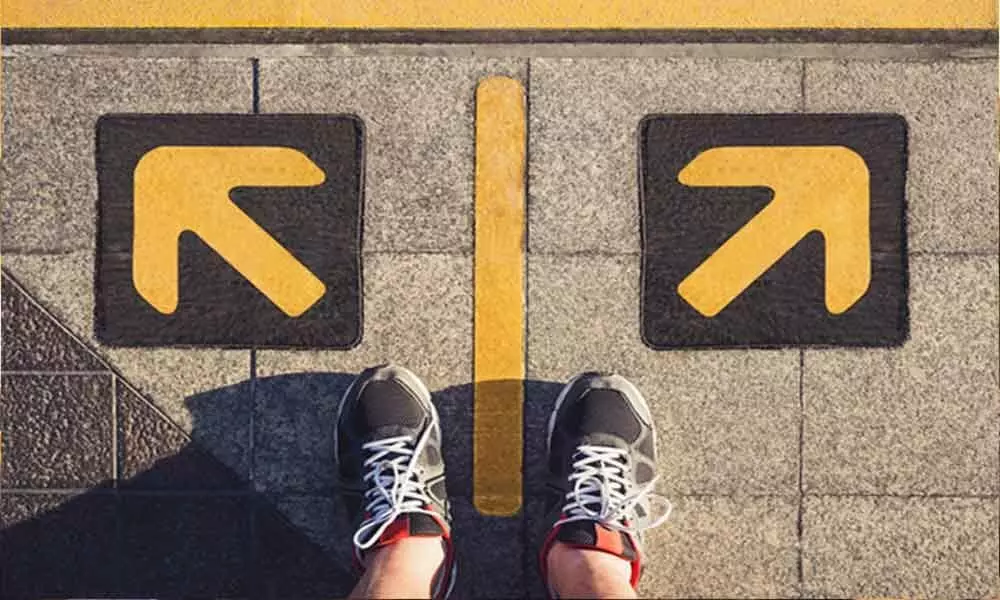Live
- Follow time slot for smooth darshan: TTD to devotees
- Dr. Sadguru Dayanidhi Meets Governor Jishnu Dev Varma at Raj Bhavan, Hyderabad
- Ganja, mobile phones traced in Central Jail
- An inspiring journey of an innovative teacher
- Commission on SC Sub-Castes Classification tours Prakasam
- CM Revanth Reddy Calls for Revival of Telugu Pride at World Telugu Federation Conference
- Crane owners appeal for waiver of life tax on AP registered cranes
- Kannada Writer and Thinker Dr Na. D'Souza Passes Away at 87
- PM to lay stone for rly zone on Jan 8
- Naidu's Kuppam to shine bright with solar power
Just In

The ability to make quick decisions in the face of ambiguity is the difference between living a life pro-actively and living a life reactively.
The ability to make quick decisions in the face of ambiguity is the difference between living a life pro-actively and living a life reactively. Many times people are afraid to make a decision because they don't feel they have enough information to go on. Unfortunately, by the time enough information does come around usually the opportunity to make the decision is long gone.
This problem of waiting too long to make decisions is largely based on a few false beliefs that many of us hold. These false beliefs keep us from making a decision when it is necessary.
The first false belief is that more information is always better. This isn't always true. Once the brain reaches a certain threshold of logical information, giving it more rarely improves your effectiveness in getting the answer right. In fact, too much information can often decrease your ability to get the answer right.
In the book, Blink, by Malcolm Gladwell, the author points to a study that was conducted involving a new method to check for heart attacks. The older method involved the doctors reviewing the patients medical history and doing a complete exam. The new method in question only checked for four things before making the recommendation.
Most people would likely assume that the method that was more in-depth would give better results. However, the opposite was true! The new method which only checked four was on average 70% better at making a correct diagnoses.
Too much information can clutter up what is the most important. It turns out that only those four properties were significant in giving a recommendation. Looking at others would only obscure your decision-making process. When this happens we actually become less effective at making decisions.
The second false belief that prevents us from making decisions is that we need to be right the first time. I believe that most of us have been taught that we cannot remake a decision once it is shown to be wrong. This is similar to how testing in schools work. If you get a question wrong on a test, you don't have another opportunity to get it right, so you'd better get the right answer before filling it in.
I believe this needlessly prevents people from making decisions and taking actions when they need to most. If you find out you are wrong, then simply go back and redo it. Don't waste time wondering whether a decision is right. Just make it. If it is wrong, you can always go back and change it.
I think another belief that prevents people from making decisions is that they don't perceive the actual risk involved. Most of the decisions we have to make will have very little downside if we are wrong and potentially a huge upside if we are right. The decision to ask someone out on a date, for example. The worst case is that you will be rejected. The best case might be finding someone to spend the rest of your life with.
Even if the risks are high, however, taking too long to make a decision might not be a good idea either. Generally in these situations more information that could help you will not come. You are probably best just picking something and going with it, rather than waiting for more information.
One reason people hesitate to take action is because they are afraid of being wrong. People are afraid of wasting a lot of time and energy only to discover they should have done things differently. I never apologize to myself for being wrong or for decisions I made in the past. As long as I made those decisions using my best reasoning skills I had at the time, then they were correct decisions regardless of the outcome.
Now I was a little hesitant when making this plan because I wasn't sure what to expect. I was thoroughly convinced that I would probably make so many changes to my plan, if not complete revisions by the time the two years were up, that the plan that is successful won't even resemble my plan today. But I made the plan anyways.
Source: www.scotthyoung.com

© 2024 Hyderabad Media House Limited/The Hans India. All rights reserved. Powered by hocalwire.com







